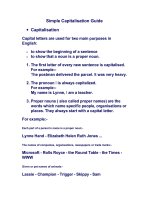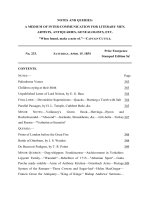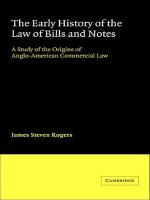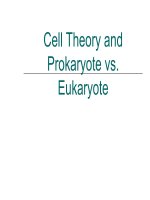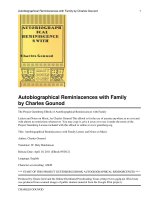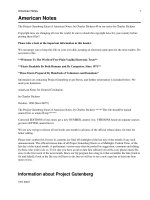- Trang chủ >>
- Đề thi >>
- THPT Quốc Gia
s2007 notes
Bạn đang xem bản rút gọn của tài liệu. Xem và tải ngay bản đầy đủ của tài liệu tại đây (229.2 KB, 4 trang )
STUDY NOTES
EPISODE 7: MARS
DETERMINERS 'SOME' AND 'ANY'
STUDY TIPS
Determiners are words, which introduce
noun phrases. They can be articles (a
friend), demonstrative adjectives (this
friend) or quantifiers (some friend and any
friend). The latter determiner, as the term
indicates, tells us something about quantity.
While both some or any refer to an
indefinite quantity, remember that
some means ‘part or not all of
something’, and any means ‘all or
none of something’.
Also, some is commonly used with
There are a variety of different quantifiers,
affirmative statements, while any
but they are commonly grouped as follows:
with negative and question
‘some and any’; ‘much, many, a lot of, (a)
sentences.
little, (a) few'’; ‘no and none’; ‘all and every’;
'both, either, neither’, and others. When
speaking and writing, whenever we use a
noun, deciding whether a quantifier is necessary, and which one for that matter, may
often have to be made. These notes focus specifically on quantifiers ‘some and any’,
and how they are used.
Quantifiers – ‘some’ and ‘any’
Deciding which quantifier to use depends on a number of factors, including the grammar, the
meaning conveyed and sometimes how formally we are speaking or writing. The tables below
summarise this information.
SOME
indicates there is an indefinite quantity of something or an indefinite number of
things or people
usually used in affirmative statements
used with uncountable nouns and plural countable nouns
used in both stressed and unstressed forms
Grammatical Structure
Example
Meaning/Use
some + plural or
uncountable
noun
I left some apples on the
table.
They did some homework in
the Learning Centre today.
Would you like some tea?
referring to an indefinite
quantity
some /s m/ unstressed
offer
+ some + ?
requests
plural or uncountable
nouns can be used;
[also: Would you like any tea?]
Shall I order some biscuits?
Could I have some milk,
please?
some /s m/ unstressed
[but not: Could I have any milk,
please?]
some + plural or
uncountable
noun
Jill likes some vegetables.
There was some water in the
kettle.
John can’t eat some types of
dairy products.
some is stressed /s m/
in reference to offers,
requests, invitations,
suggestions; can be used in
question sentences, where a
‘yes’ answer is expected
refers to a limited quantity or
type of something; used in
both affirmative and negative
sentences, as well as
questions
Page 1 of 4
Grammatical Structure
Example
Meaning/Use
some + countable
noun
I spoke to some consultant
over the phone.
I got it from some shop.
used when emphasising that
the identity of someone or
something is unknown, or
the identity is irrelevant
talking about a hypothetical
quantity or amount
some is stressed /s m/
‘if’ – clauses
if + some + plural or
uncountable
noun
If you need some money,
please let me know.
some + of + noun
phrase
Some of the tickets were sold.
I drank some of the tea.
some + a number
The beach is some twenty
kilometres from the city.
I bought some fish but
couldn’t get any chips.
I bought some fish, but there
were no chips left.
opposite of some is
no or not … any
Collocations
some + abstract
uncountable nouns
some + concrete
uncountable nouns
used when referring to a
certain quantity of a group of
things, or when it is a part of
something
indicating you are not
completely accurate
indicating an opposite
meaning
advice, confidence, courage, education, experience, grammar,
happiness, help, homework, honesty, importance, information,
intelligence, justice, knowledge, laughter, luck, music, news,
patience, peace, progress, significance, space, time,
vocabulary, work
group of similar items: baggage, cash, clothing, equipment,
food, fruit, furniture, jewellery, luggage, mail, money, traffic
fluids: blood, coffee, milk, petrol, soup, tea, water
solids: bread, butter, cheese, cotton, glass, gold, iron, paper
gases: air, nitrogen, oxygen, pollution, smoke
particles: dirt, dust, flour, grass, hair, pepper, rice, salt, sand,
sugar, wheat
languages: Arabic, Chinese, English, French, German, Thai
fields of study: accounting, business, chemistry, economics,
engineering, finance, literature, mathematics, psychology
activities: driving, jogging, jumping, running, snorkelling,
studying, surfing, swimming, travelling, walking
natural phenomena: fire, fog, hail, heat, humidity, lightning,
rain, snow, sunshine, thunder, wind
Page 2 of 4
Collocations - continued
phrases
some time = a lengthy period of time or at an unspecified time
We haven’t seen them for some time.
I’ll be in Sydney some time this evening.
some more = an extra quantity/amount of something
The chocolate cake is divine. Would you like some more?
and then some = an informal expression which is used to
emphasise that the quantity of something is even more
If I had to guess there were 5,000 teenagers and then some
at the concert.
to some extent = partly
I would agree with you to some extent but the other issues
regarding the ID card are far more important.
some day = an unspecified time in the future
I’d like to meet David Beckham some day.
ANY
indicates an indefinite quantity of something, or a quantity of something which may
or may not exist
usually used in negative statements and questions
usually used with plural and uncountable nouns
used in both stressed and unstressed forms
Grammatical Structure
Example
Meaning/Use
any + plural or
+?
uncountable
noun
Are there any biscuits left?
Do you have any information
on that?
asking about a quantity
without specifying, or asking
whether something exists
There aren’t any tickets
available. Not even one.
Christine doesn’t speak any
Chinese. None at all.
when saying something
doesn’t exist
(question sentences)
not + any + plural or
uncountable
noun
(negative statements)
no may be used
instead of not … any
any + singular,
plural or
uncountable
noun
John doesn’t have any
patience with his students.
John has no patience with his
students.
You may borrow any book.
Are there any cakes left?
I don’t eat any meat.
in formal, written English the
no structure is preferred
referring to a unrestricted or
unlimited quantity or choice
any is stressed /' ni/
(affirmative and negative
statements, and
questions)
Page 3 of 4
Grammatical Structure
Example
Meaning/Use
If you have any questions, you
‘if’ – clauses
can ask the counsellor.
if + any + plural or
uncountable
noun
talking about a hypothetical
quantity or amount
any + of + noun phrase
referring to an unspecified
number of people or things,
or to part of something
Do you have any of his CDs?
Collocations
any + abstract
uncountable nouns
any + concrete
uncountable nouns
adverbs with negative
meaning
‘without’
phrases
advice, confidence, courage, education, experience, grammar,
happiness, help, homework, honesty, importance, information,
intelligence, justice, knowledge, laughter, luck, music, news,
patience, peace, progress, significance, space, time,
vocabulary, work
group of similar items: baggage, cash, clothing, equipment,
food, fruit, furniture, jewellery, luggage, mail, money, traffic
fluids: blood, coffee, milk, petrol, soup, tea, water
solids: bread, butter, cheese, cotton, glass, gold, iron, paper
gases: air, nitrogen, oxygen, pollution, smoke
particles: dirt, dust, flour, grass, hair, pepper, rice, salt, sand,
sugar, wheat
languages: Arabic, Chinese, English, French, German, Thai
fields of study: accounting, business, chemistry, economics,
engineering, finance, literature, mathematics, psychology
activities: driving, jogging, jumping, running, snorkelling,
studying, surfing, swimming, travelling, walking
natural phenomena: fire, fog, hail, heat, humidity, lightning,
rain, snow, sunshine, thunder, wind
never any, hardly any, rarely any
The bakery rarely has any bread left after 10:00 am.
without any
The matter was attended to without any problems.
in any event = whatever the situation may be, something will
happen
I might come to the party, but in any event I’ll let you know.
in any case = also, in addition but actually emphasises what
follows as it’s the most important piece of information
I won’t be going rock climbing with you, and in any case, I’m
afraid of heights.
by any chance = a polite way of asking a question or
requesting something which might be true
Do you speak English, by any chance?
any day now = soon
Have you heard from Sue? No, but we’re expecting a call any
day now.
with any luck = an expression used to describe something
you’re hoping for
With any luck, you might win tonight’s lottery.
Page 4 of 4
